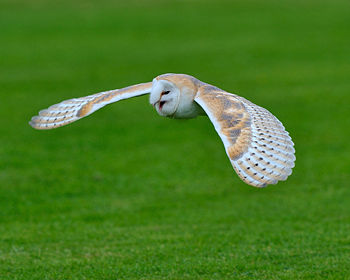Bionics: Difference between revisions
Jump to navigation
Jump to search

imported>Daniel Mietchen m (slight expansion) |
imported>Daniel Mietchen (+image) |
||
| Line 1: | Line 1: | ||
{{subpages}} | {{subpages}} | ||
{{Image|Barn owl in flight.jpg|right|350px|A [[barn owl]] in flight — a natural model for technical flight.}} | |||
'''Bionics''' is a subfield of both science and engineering, concerned with the systematic study of biological structures and processes to the end of applying these principles in technical design. Many aspects of the shape, skeleton and skin of human-made vehicles for locomotion in air or water have been improved this way, while bionics also played a role in the invention of [[hook-and-loop fastener]]s and in the construction of highly water-repellent surfaces. | '''Bionics''' is a subfield of both science and engineering, concerned with the systematic study of biological structures and processes to the end of applying these principles in technical design. Many aspects of the shape, skeleton and skin of human-made vehicles for locomotion in air or water have been improved this way, while bionics also played a role in the invention of [[hook-and-loop fastener]]s and in the construction of highly water-repellent surfaces. | ||
Revision as of 15:47, 16 September 2009
Bionics is a subfield of both science and engineering, concerned with the systematic study of biological structures and processes to the end of applying these principles in technical design. Many aspects of the shape, skeleton and skin of human-made vehicles for locomotion in air or water have been improved this way, while bionics also played a role in the invention of hook-and-loop fasteners and in the construction of highly water-repellent surfaces.
